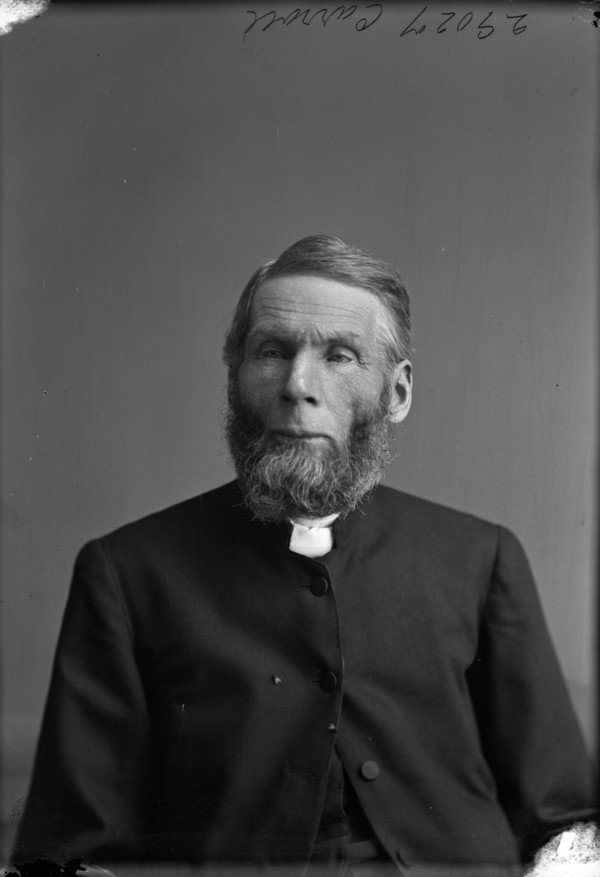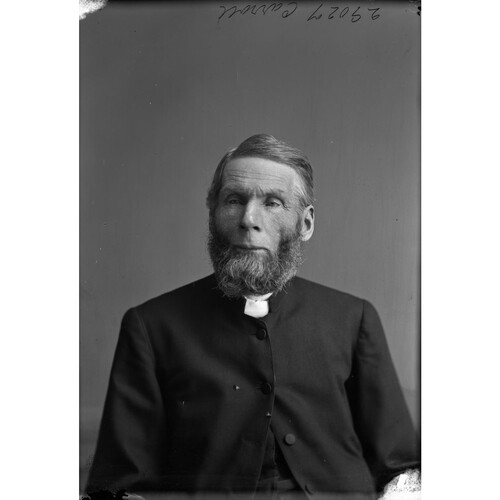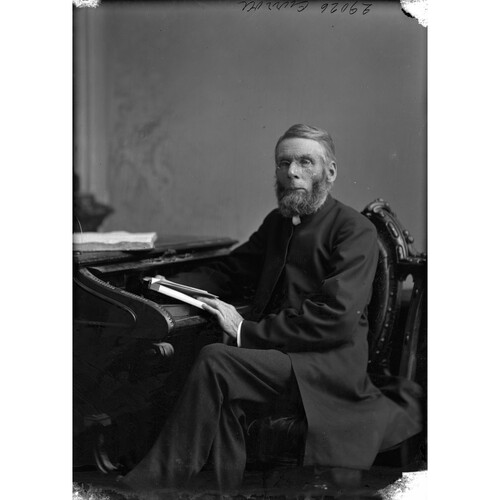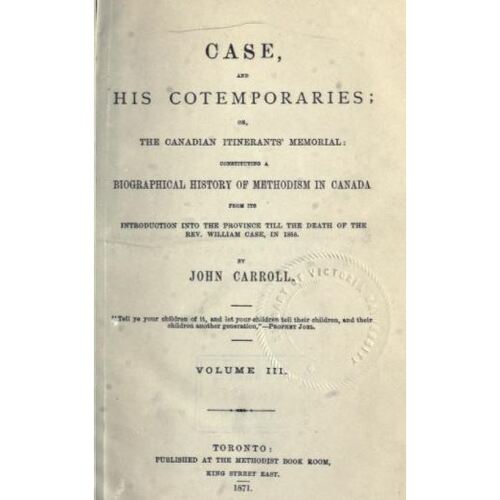CARROLL, JOHN SALTKILL (he never used his middle name), Methodist clergyman and author; b. 8 Aug. 1809 in a fishing hut on Saltkill’s Island, Passamaquoddy Bay, N.B., the elder of twin sons of Joseph Carroll and Molly Rideout; m. in 1833 Beulah Adams of Perth, Upper Canada, and they had one son; d. 13 Dec. 1884 at Leslieville (now part of Toronto), Ont.
John Carroll’s father, a saddler originally from County Down (Northern Ireland), was shipwrecked on the coast of New Brunswick after service on the British side in the American revolution and he settled in that province for some years. John was born in the course of a move by the family to Upper Canada and spent his first years in the Niagara peninsula and along the Grand River. His father served in the War of 1812, and in 1814 the family settled in York (Toronto) where John’s mother ran a boarding-house. His early formal education was much interrupted and virtually ended in the winter of 1817–18 when the York school, first conducted by William Barber, closed. In 1822–23 he spent an unhappy year on a brother’s bush farm northwest of York, and with his return to town became an apprentice in Jesse Ketchum*’s tannery.
Although religion seems to have been little practised in the home during Carroll’s childhood, the New Light revival of Henry Alline* in New Brunswick had made a strong impression on several members of the family. Carroll’s mother suffered for some years from religious melancholy, and an older brother underwent an impressive conversion towards the end of his brief life. John was enrolled in the first Methodist Sunday school in York at its inception in 1818; he was converted under Methodist preaching on 24 Aug. 1823, and a few weeks later experienced “persuasion that God had cleansed my inmost heart.” In 1827, after a short period of teaching in the town of Scarborough, he was received on probation as a preacher, and in 1833 was ordained by the Canadian Wesleyan Conference which had just come into being through the affiliation of Canadian and British Methodists.
With the exception of the 1839–40 season, when because of ill health he was assigned the post of tutor at Upper Canada Academy, Cobourg, Carroll held a number of pastorates in Upper and Lower Canada until his superannuation in 1870. He then lived in Leslieville and at the time of his death was still engaged in founding suburban congregations around Toronto. He served as a chairman in ten different districts over a period of 27 years. In 1863 he was elected co-delegate or vice-president of the annual conference of the Wesleyan Methodist Church, the highest Methodist office open to a Canadian. The following year he addressed the Methodist Episcopal general conference in Philadelphia, and in 1876 the University of South Carolina conferred on him an honorary dd. He seems to have been a man who enjoyed the confidence of his fellow ministers rather than one distinguished for outstanding gifts of administration or leadership. Essentially Carroll was an effective revivalist, most at home in a camp-meeting or on a new circuit, and in his later years he came to symbolize an era of “happy” Methodism that was rapidly disappearing in such centres as Toronto with its settled congregations.
In the controversies that frequently convulsed Upper Canadian Methodism, Carroll always stood with the main Wesleyan body of the Canadian conference. He took this position in disputes with the followers of Henry Ryan* who in the late 1820s were opposed to links with American Methodism; he did so again with the Methodist Episcopals who objected to the 1833 union with the British Wesleyan Conference. From 1845, however, he also worked continuously for the union of all branches of Canadian Methodism, and on one occasion issued a scheme of his own that offered concessions to minority groups. His Reasons for Wesleyan belief and practice, relative to water baptism (1862), an exposition of the Wesleyan Methodist position on the subject, was endorsed by officials of all Canadian Methodist groups.
Carroll is chiefly remembered, however, neither as a preacher nor as a controversialist, but as a chronicler of early Methodism and of pioneer life in Upper Canada. He began in 1837 to send historical sketches to the Christian Guardian (Toronto), and between 1867 and 1877 published Case and his cotemporaries, a laborious five-volume compilation of facts about early Canadian Methodism that is not only indispensible to the historian but is also interesting to the general reader for the anecdotes of saddle-bag preachers scattered through it. Carroll’s admiration for William Case* as a kind of hero figure is reflected in the title. The stripling preacher (1852) and “Father Corson” (1879) are works of pious remembrance. Of greatest literary interest among Carroll’s writings are My boy life (1882), a series of sketches of his childhood and youth in York, most of which had originally appeared as instalments in Pleasant Hours, a Sunday school paper, Past and present (1860), a series of “crayons” of Methodist worthies reprinted from the Canadian Methodist Magazine, and The school of the prophets (1876), a frank account of Methodist personalities in the Perth area at the time of his pastorate there in the early 1830s, in which his talent for humorous description is least restrained by concern for denominational respectability.
Carroll’s works abound with the clichés and conceits of the self-educated writer. He could on occasion be tedious or over-earnest, but at his best he was a skilful unmasker of pious foibles and pomposities. Few other writers have described 19th-century Canadian Methodism from within, and none with such irreverent yet sympathetic wit.
J. S. Carroll was the author of: The besiegers’ prayer; or, a Christian nation’s appeal to the God of battles, for success in the righteous war: a sermon . . . preached in St. John’s Canada East, on the occasion of the “General Fast,” April the 18th, A.D. 1855 (Toronto, 1855); Case and his cotemporaries; or, the Canadian itinerants’ memorial: constituting a biographical history of Methodism in Canada . . . (5v., Toronto, 1867–77); The “exposition” expounded, defended, and supplemented (Toronto, 1881); “Father Corson”; or, the old style Canadian itinerant: embracing the life and gospel labours of the Rev. Robert Corson . . . (Toronto, 1879); “Ministerial experience thirty years ago,” Wesleyan Repository, and Literary Record (Toronto), 1 (1860–61): 9–13, 46–50; My boy life, presented in a succession of true stories (Toronto, 1882); A needed exposition; or, the claims and allegations of the Canada Episcopals calmly considered, by one of the alleged “seceders” (Toronto, 1877); Past and present, or a description of persons and events connected with Canadian Methodism for the last forty years . . . (Toronto, 1860); Reasons for Wesleyan belief and practice, relative to water baptism . . . (Peterborough, [Ont.], 1862); The school of the prophets; or, Father McRorey’s class, and ’Squire Firstman’s kitchen fire, a fiction founded on facts (Toronto, [1876]); The stripling preacher, or a sketch of the life and character, with the theological remains of the Rev. Alexander S. Byrne (Toronto, 1852); Thoughts and conclusions of a man of years concerning churches and church connection (Toronto, [1879]). J. W. Grant edited Salvation! O the joyful sound: the selected writings of John Carroll (Toronto, 1967).
PANB, Genealogical reference files, “Nicholas and Sarah Oliver Rideout family, Maugerville, N.B.” (typescript). UCA, Matthew Richey papers, 1841–54, John Carroll to Matthew Richey, 3 July 1848. Methodist Church (Canada, Newfoundland, Bermuda), Toronto Conference, Minutes (Toronto), 1885: 14–15. Canada Christian Advocate (Hamilton, Ont.), 13, 27 March, 22 May, 12 June 1872. Christian Guardian, 10, 17 Dec. 1845; 2 Feb. 1848; 2, 9 July 1862; 5 Aug. 1863; 25 May 1864; 11 Oct. 1865; 5 Jan. 1877; 17 Dec. 1884; 4 Feb. 1885; 31 Dec. 1902. Cornish, Cyclopædia of Methodism, I: 39, 75, 750; II: 74. [W. H. Withrow], “Memories of the late Rev. Dr. Carroll,” Canadian Methodist Magazine, 24 (July–December 1886): 550–53.
Cite This Article
John Webster Grant, “CARROLL, JOHN SALTKILL,” in Dictionary of Canadian Biography, vol. 11, University of Toronto/Université Laval, 2003–, accessed February 19, 2026, https://www.biographi.ca/en/bio/carroll_john_saltkill_11E.html.
The citation above shows the format for footnotes and endnotes according to the Chicago manual of style (16th edition). Information to be used in other citation formats:
| Permalink: | https://www.biographi.ca/en/bio/carroll_john_saltkill_11E.html |
| Author of Article: | John Webster Grant |
| Title of Article: | CARROLL, JOHN SALTKILL |
| Publication Name: | Dictionary of Canadian Biography, vol. 11 |
| Publisher: | University of Toronto/Université Laval |
| Year of publication: | 1982 |
| Year of revision: | 1982 |
| Access Date: | February 19, 2026 |






